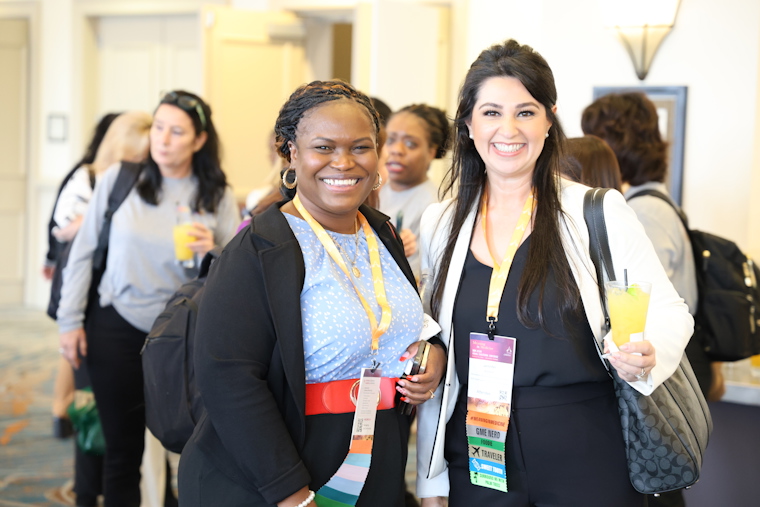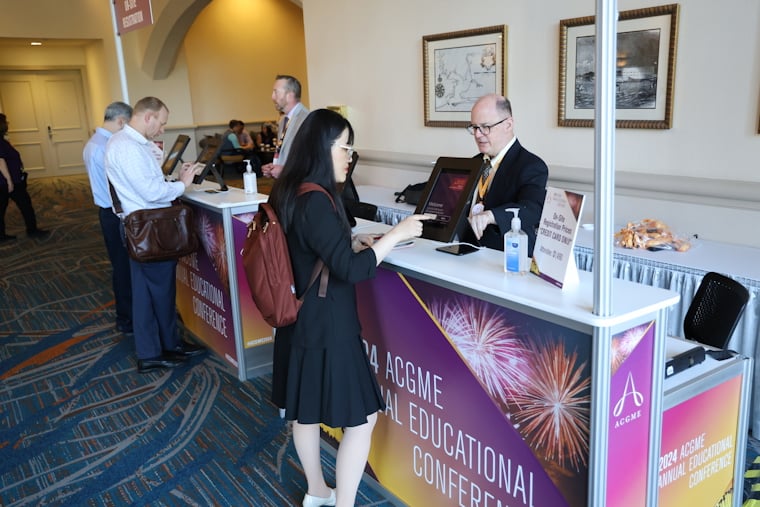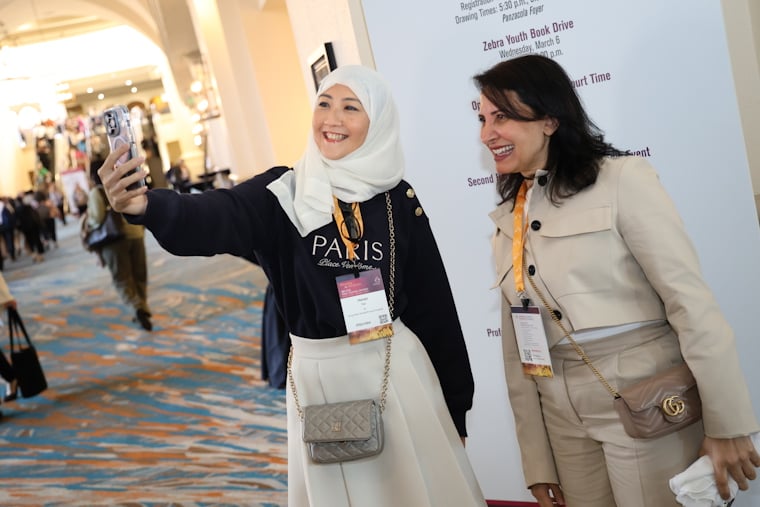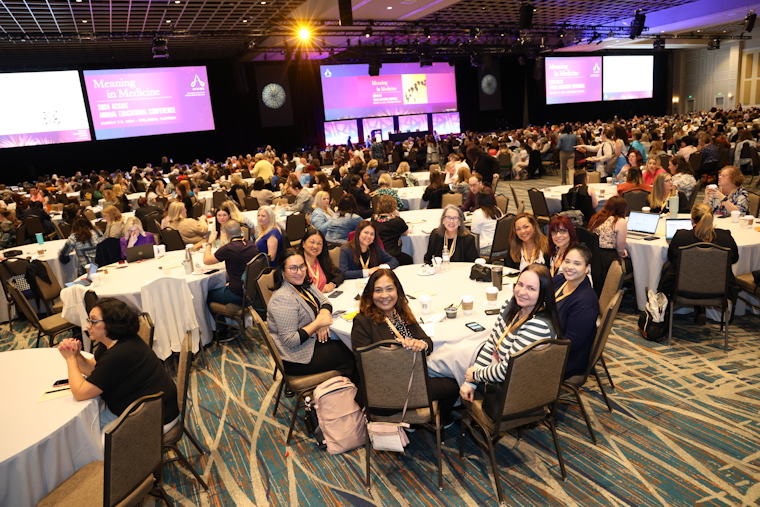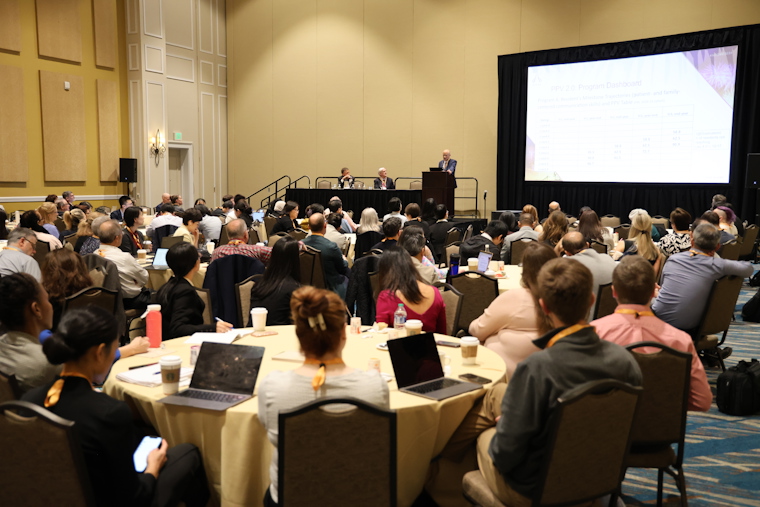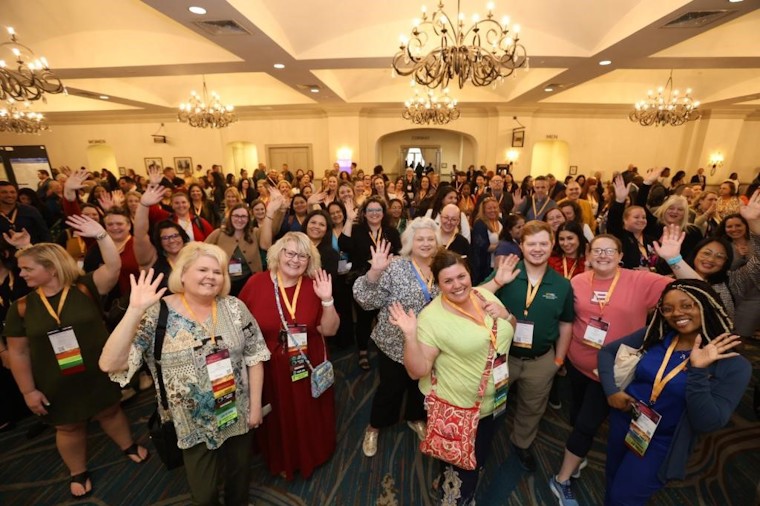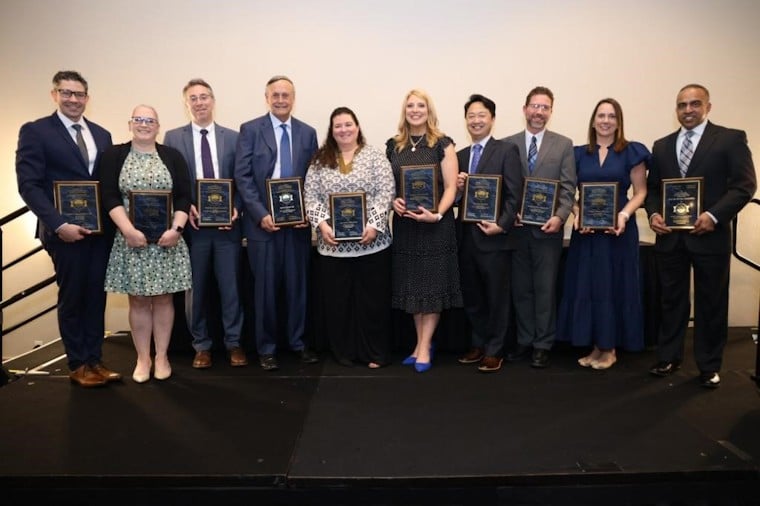Reunions, learning, and high energy punctuated the first day of the 2024 ACGME Annual Educational Conference, as more than 4,400 graduate medical education (GME) professionals convened for a schedule of Full-Day Courses and receptions.
Six Full-Day Courses were offered, each tailored to specific roles and functions in GME, followed by a networking event for coordinators, the annual Marvin R. Dunn Welcoming Poster Reception and Exhibitor Kick-Off, and a celebratory dinner for the 2024 ACGME and ACGME International Award winners.
Insights into the Accreditation Process: A Course for Program Directors
GME program leaders filled the room for this annual Full-Day Course designed to break down and simplify accreditation review. Through both didactic presentations and interactive Q and A sessions, program directors got an overview of the ACGME and its Review Committees, and learned details and insights about the review process, ACGME data collection, the Common Program Requirements, the Clinical Competency Committee, assessment of residents/fellows, and program evaluation.
In a session focused on accreditation site visits, ACGME Accreditation Field Representative Judith D. Rubin, MD, MPH walked attendees through the process and offered useful tips to reduce the stress around the event. “Don’t be afraid of us,” she reminded the room of program directors, “we are on the same side.”
Osteopathic Recognition Full-Day Course
The ACGME/AOGME Osteopathic Recognition Full-Day Course opened with a presentation from Natasha Bray, DO, MSEd, who served as a past chair of the ACGME Osteopathic Recognition Committee and on the ACGME Board of Directors. Dr. Bray reviewed the evolution of osteopathic medicine through the lens of diversity in the DO workforce and the communities it serves. The sessions that followed offered guidance on creating a faculty development framework that incorporates Osteopathic Principles and Practice, sharing resources to increase leadership in osteopathic education within a program, integrating osteopathic manipulative medicine into a residency program, and more. Members of the Osteopathic Recognition Committee and the ACGME staff members kicked off the afternoon sessions, providing insights into the recognition and review process to help program leaders understand what to expect.
Full-Day Course for Designated Institutional Officials (DIOs)
DIOs occupy a unique role in GME, and this year’s Full-Day Course continued to build community through extensive interactive exercises to harness the collective experience and knowledge of the room. ACGME Chief Sponsoring Institutions and Clinical Learning Environment Officer Kevin B. Weiss, MD, MPH noted that the role of the DIO is ever-changing. Much like not being able to cross the same river twice the same way, he added, “the role is bigger than just working with us.”
In an interactive session, the standing-room-only audience discussed the defining features of the DIO in 2024, with diverse responses ranging from keeping residents happy to being a disciplinarian and providing oversight, to managing turnover and generational differences over the concept of professionalism.
The course also offered DIOs the opportunity to learn more about specific topics, such as clinical learning environment and GME integration, effective leadership, and change management.
Advancing the Implementation of Outcomes-Based Research in Medical Education through Research
This Full-Day course, designed for medical educators and researchers, focused on putting evidence-based educational research to use to support learners’ professional development and program improvement. Discussions addressed how programs and institutions can advance educational improvement by using various types of outcomes data—like clinical and patient safety indicators, patient observations, work-based assessments, and the Milestones—to enhance learners’ outcomes.
“Learning is non-linear,” noted speaker Martin Pusic, MD, director of the American Board of Medical Specialties Research and Education Foundation. He added that competency-based medical education (CBME) properly separates non-linear learning from patient outcomes, with the goal of precision education for each resident and best outcomes for patients.
Course attendees developed evidence-informed action plans to improve their own GME programs and advance CBME.
Program and Institutional Strategies for Inclusive Learning Environments
New to the Full-Day Course offerings, this session was designed to provide GME and diversity, equity, and inclusion (DEI) leaders with skills and strategies for increasing resident, fellow, and faculty member recruitment and retention, and creating inclusive learning environments.
“There’s nothing political about what we’re doing,” said presenter and DEI consultant Christen Behzadi, MD. “We want to take better care of patients. That is the scope of what we’re doing here.”
Kemia Sarraf, MD, MPH, RCC, RCC, TIPC gave a primer on how decision-making and information-processing diminishes when the brain is under chronic stress. When the goal is to teach residents and fellows how to be effective physicians as quickly as possible, reducing learners’ stress is not only ethical, it’s practical, she said. Residents and fellows who feel safe in their environments will learn more efficiently and effectively.
“Trust and safety shorten the learning curve,” said Dr. Sarraf.
Attendees also learned how to mitigate resistance to DEI efforts. To be successful, DEI learning initiatives should:
- consider change management foundations;
- align with an overarching DEI strategy at the organizational level;
- be appropriate for the DEI maturity of the organization;
- build the skills and capabilities (equity fluency) of individuals; and,
- be relevant to the organization’s work.
Other topics covered included how to diversify GME through recruitment and retention – of both residents/fellows and faculty members, and how to make lasting changes for a more inclusive culture. After listening to presentations, attendees worked together in small groups in facilitated activities designed to allow them to apply the concepts that were discussed.
Coordinator Forum: Navigating with Confidence
The largest of the Full-Day Courses, with a record of nearly 1,800 attendees, the 14th annual Coordinator Forum: Navigating with Confidence provided both new and more experienced institutional and program coordinators with a rich and inspiring venue to learn and connect. The forum included two plenaries, Approaches to Reducing Stressors in Coordinators Professional Lives and The Empowered GME Coordinator: A Framework to Grow, Thrive, and Succeed, as well as several topical breakouts throughout the day.
ACGME Director, Educational Activities Lauren Wojnarowski, MS welcomed attendees and set the tone for the day, sharing an overview of the schedule, and reminding the attendees that, despite stresses they may deal with in the day-to-day, everyone was there because, “we care about the work, and we care about each other.”
Building on this theme, the first plenary, Approaches to Reducing Stressors in Coordinators’ Professional Lives, led by a panel that included ACGME staff members Stuart Slavin, MD, MEd and Nicholas Yaghmour, MPP, and two coordinators, Aurea Baez-Martinez, MS, C-TAGME and Coranita Burt, reviewed results of a recent, national coordinator well-being survey and shared strategies to enhance coordinator well-being and to identify and set boundaries.
In the afternoon’s high-energy plenary, The Empowered GME Coordinator: A Framework to Grow, Thrive, and Succeed, presenters Caroline Diez, MBA, C-TAGME and Diana Singer, PhD, RN, CCRN, CE, C-TAGME shared their personal and professional journeys in GME and offered practical advice and tips for coordinators.
The course was immediately followed by an energetic Coordinator Networking Reception event, featuring games and activities to help attendees find meaningful connections among their professional peers.
Ending the Day in Celebration
Thursday concluded with the annual Marvin R. Dunn Welcoming Poster Reception and Exhibitor Kick-Off. Attendees gathered in the conference Exhibit Hall, perusing the exhibitor offerings, mingling and sharing experiences from their courses, viewing and discussing more than 70 academic posters with their authors, and connecting with ACGME staff members in the ACGME Hub. In addition to the exhibits and opportunities to learn about ACGME programs and initiatives, the Exhibit Hall also features a Career Resources area as well as several activities and ways to unwind and relax. In addition, the reception allowed conference attendees to give back to the local community by packing 1,000 meal kits with the Second Harvest Food Bank of Central Florida and contributing their artistic flair to a mural that will be donated to the Zebra Youth Center in Orlando.
Finally, at a special dinner, the ACGME and ACGME International honored and celebrated their 2024 Award recipients. More than 30 individuals, organizations, and institutions were recognized for their innovations and dedication to GME. This was the inaugural year for the ACGME’s newest award, the second ACGME Award given specifically to current residents and fellows: the Lewis Blackman Patient Safety Award.
Looking Ahead
Friday’s agenda includes the conference’s Welcome and Opening Remarks, the President’s Plenary, four Featured Plenaries, and a full day packed with exciting and insightful educational sessions, networking opportunities, and engagement activities. Come back to the ACGME Blog for the recap!

